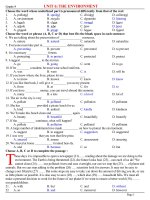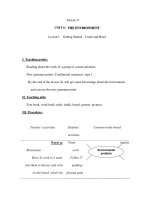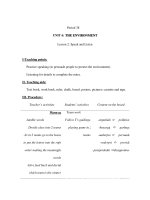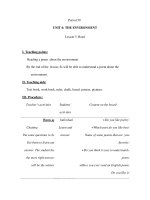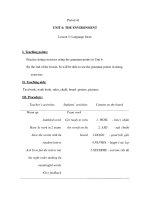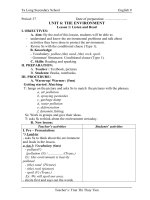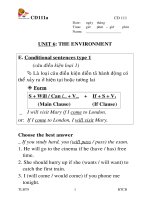- Trang chủ >>
- Khoa Học Tự Nhiên >>
- Vật lý
Unit 6. The environment
Bạn đang xem bản rút gọn của tài liệu. Xem và tải ngay bản đầy đủ của tài liệu tại đây (170.36 KB, 12 trang )
<span class='text_page_counter'>(1)</span><div class='page_container' data-page=1>
<i> - Week: 20, 21, 22 </i>
<i> - Form: 9A 4, 6, 8, 9 </i>
<i> - Period: 37, 38, 39, 40, 41</i>
<i> - Date of teaching: 26 /12 /2016 ->11 /01/2017 </i>
<b>UNIT 6: THE ENVIRONMENT</b>
<i><b>PERIOD 37 : GETTING STARTED – LISTEN </b></i>
<i><b> READ</b></i>
<b>I.OBJECTIVES:</b>
- Developing sts’ reading skill.
- After studying the lesson, sts. will be able to know more about the environmental
problems and solutions.
- Sts. realize the importance of clean environment and they know what they should
do to protect the environment.
<b>II. LANGUAGE CONTENTS:</b>
<b>1. Grammar: - </b>adj/ adv ; conditional sentence (type1) - review
- adjective + that clause
<b>2. Vocabulary: </b>The words relating to the environmental problems
<b>III. METHOD AND TEACHING AIDS:</b>
<b>1. Method: </b>Audio-lingual method, communicative approach.
<b>2. Teaching aids:</b> - Pictures, cassette player, tape, textbook …
<b>IV. TEACHING PROCEDURES:</b>
<b>1-Warm up: </b>
- Ask sts to think about the environmental problems in their city
- Get sts to go to the board and write down their ideas
<i><b>* Possible answers </b></i>
<i>- rubbish, garbage, trash, sewage…</i>
<i>- dust, smoke from cars, motorbikes and factories …</i>
<b>* Getting started:</b> ( Matching )
- Ask sts to look at the six pictures in their textbooks
- Ask them to match the words or phrases in the box with the correct pictures
- Call on some sts. to give their answers -> correct -> explain new words :
<i>+ Garbage (n) / rubbish/ trash</i>
<i>+ dump (n) </i>
<i>-> garbage dump</i>
<i>+ polutte (v) -> polluted (a) # unpolluted (a) </i>
<i> -> pollution (n) -> air pollution / water pollution</i>
<i>+ forest (n)</i>
<i>+ deforest (v)</i>
<i>+ deforestation (n) </i>
<i>+ dynamite (n) -> dynamite fishing</i>
<i>+ spray (v) </i>
<i>+ pesticide (n) </i>
<i><b>* Answer:</b></i>
<i>Picture a: air pollution</i> <i>Picture d: water pollution</i>
</div>
<span class='text_page_counter'>(2)</span><div class='page_container' data-page=2>
<b>2. Presentation</b>
- Set the scene: “<i>Mr. Brown is talking to some volunteer conservationist</i>s.<i> Listen to the </i>
<i>tape then tell the place where they are now and what they are going to do.”</i>
- Let sts listen to the tape twice. (keep the books closed)
<i><b>* Answer:</b>They are on a beach now and they are going to clean the beach.</i>
- Introduce the text and explain some more new words and structures.
<b>* Vocabulary</b>
<i>+ conserve (v)</i>
<i>+ conservation (n)</i>
<i>+ conservative (a)</i>
<i>+ conservationist (n) -> volunteer conservationist</i>
<i>+ shore (n) </i>
<i>+ check (v)</i>
<i>+ rock (n) </i>
<i>+ spoil (v)</i>
<i><b>* Conditional sentence ( review )</b></i>
<i>Ex: If we work hard, we’ll make this beach a clean and beautiful place again.</i>
<i><b>* adj/ adv ( review) </b></i>
<i> kind (a) ->kindly (adv) </i>
<i><b>* That clause after adjective</b></i>
<i>Ex: I’m disappointed that people have spoiled this area. </i>
<i> <b>adj.</b></i> <i><b> that clause</b></i>
<b>3. Practice</b>
- Ask sts. to read the text in silence.
<i><b>a) Read and Match (p48)</b></i>
- Have sts. work in pairs to match the names in column A with activities in column B.
- Give feedback and correct
<i><b>* Answers:</b></i> <i>1-f, 2-e, 3-b, 4-a, 5-c, 6-d</i>
<i><b>b) Comprehension questions (p48)</b></i>
- Have sts. read text again to find out the answers for the questions 1->5.
- Call on some pairs of sts. to ask and answer the questions in front of class -> correct
<i><b>* Answers:</b></i>
<i>1. Mr. Brown is the speaker.</i>
<i>2. The listeners are members of volunteer conservationists.</i>
<i>3. They are on the beach.</i>
<i>4. They are going to clean the beach.</i>
<i>5. If they work hard, they will make the beach a clean and beautiful place again.</i>
<b>4. Consolidation</b>
<i><b>* Discuss questions 6, 7 (p48) in group:</b></i>
- Call on some sts. to give their ideas to the questions 6,7 before class ( speaking )
</div>
<span class='text_page_counter'>(3)</span><div class='page_container' data-page=3>
<i>7. Sts’ answer ( If the pollution continues, the environment around us won’t be good </i>
<i>and it will be harmful to our health, our life./ the earth will be destroyed. )</i>
<b>5. Homework : </b>
- Write down the answers ( exercise b) on notebooks.
- Learn new words by heart and prepare “ SPEAK - LISTEN”/ p49
<b>V. TEACHING EXPERIENCE:</b>
__________________________
<b>UNIT 6: THE ENVIRONMENT</b>
<i><b>Period 38 : SPEAK - LISTEN</b></i>
<b>I.OBJECTIVES:</b>
- Developing sts’ listening and speaking skills.
- After studying the lesson, sts. know how to persuade S.O to do S.th to protect
the environment.
- They can understand and take notes the main ideas after listening a report on
how oceans are polluted.
<b>II. LANGUAGE CONTENTS:</b>
<b>1.Grammar:</b> - expressions to persuade S.O to do S.th
<i> - Why / How come…? -> Because …</i>
<b>2. Vocabulary: </b>The words relating to the environmental problems and solutions.
<b>, </b>
<b>III. METHOD AND TEACHING AIDS:</b>
<b>1. Method: </b>Audio- lingual method, communicative approach
<b>2. Teaching aids: </b> text-book, cardboard, tape + cassette player …
<b>IV. TEACHING PROCEDURES:</b>
<b>1 Warm up (jumbled words)</b>
- Divide the class into 2 teams
- Sts from each team go to the board and write the correct words
- The team which writes more correct words first wins the game
<i>1. uaderpse = persuade</i>
<i>2. beaargg = garbage</i>
<i>3. roderpvi = provide</i>
<i>4. lupotilon = pollution</i>
5. <i>duproce = produce</i>
<b>* SPEAK</b>
<b>2. Pre – speaking:</b>
</div>
<span class='text_page_counter'>(4)</span><div class='page_container' data-page=4>
- <i>I think you should …</i>
<i>- It would be better if you …</i> <i>+ <b>V</b> (inf.)</i>
<i>- Why don’t you …?</i>
<i>- Why not …? </i>
<i>- Won’t you …?</i>
<i>- What about / How about …?</i> + <i><b>V-ing</b></i>
- Introduce the example on page 49
- Explain new words:
<i>+ leaf ( sing.n) -> leaves ( pl.n)</i>
<i>+ wrap (v)</i>
<i>+ reduce (v)</i>
<i>+ reuse (v)</i>
<i>+ recycle (v)</i>
<i>+ natural resource </i>
<i>+ throw – threw – thrown (v) away/ into/ </i>
<i>onto…</i>
<i>+ do harm to… </i>
<i>+ garbage bin (n)</i>
<i>+ energy (n)</i>
<i>+ prevent…from (v)</i>
<i>+ public bus </i>
<i>+ avoid (v)</i>
<i>+ exhaust fume </i>
<b>3. While speaking </b>
<b>* Activity a</b>
- Ask sts. to practice in pairs to persuade their partners, using the expressions and and the
idea cues given.
- Call on some pairs to practice their dialogue before class.
<b>* Activity b:Questionnaire</b>
- Let sts. practice in pairs to answer the questions in the questionnaire
- Give feedback. Teacher may write some possible answers on the board so that weak sts
can follow.
- Ask sts to practice asking and answering
<i><b>* Suggested answers</b></i>
<i>1. How can we save paper?</i>
<i>- recycle used paper, newspapers…</i>
<i>- use banana leaves for wrapping </i>
<i>- write on both sides of the paper</i>
<i>2. How can we use fewer plastic bags?</i>
<i>- save plastic bags, clean and reuse them </i>
<i>- use paper bags instead of plastic bags </i>
<i>3. How can we reduce water pollution?</i>
<i>- don’t throw wastes and garbage into streams, lakes, or river and even oceans</i>
<i>4. How can we prevent littering?</i>
<i>- put garbage bins around the school yard and public places</i>
<i>- discard/ throw garbage in waste bins.</i>
<i>5. How can we reduce air pollution?</i>
<i>- use less private vehicle, use public buses or bikes instead of motorbikes </i>
<i>- don’t release pollutants into the air…</i>
</div>
<span class='text_page_counter'>(5)</span><div class='page_container' data-page=5>
<b>* Activities c:</b>
- Call 2 sts. to say the the example again before class first.
<b>- </b>Ask sts. to work in pairs, discussing the best way to protect the environment.
<b>4. Post speaking </b>
- Divide the class into 4 groups. Ask them to discuss the question “ <i>what do you do to </i>
<i>protect the environment at your school? </i>”
- Ask representatives of groups to tell their ideas before class.
<b>* LISTEN</b>
<b>1. Pre-listening</b>
<i><b>* Vocabulary</b></i>
<i>- sewage (n)</i>
<i>- spill (n,v)</i>
<i>-> raw sewage (n) </i>
<i>- marine (a)</i>
<i>- pump (n)</i> <i>->marine life</i>
<i>- vessel (n) = ship(n) </i> <i>- deliberate (v)</i>
<i>- guilty (a) -> to be guilty of …</i> <i>- have an accident</i>
<i>-</i> Have sts work in pairs to read the notes in the box and guess the reasons make the
ocean polluted before listening.
<b>2. While listening</b>
- Ask sts to listen to the tape twice and check their prediction
<b>3. Post listening</b>
- Call on some sts. to give their answers
- Give feedback and correct
<i><b>* The answers: </b></i>
<i>Secondary: garbage was …</i>
<i>Thirdly : ……come from ships at sea.</i>
<i>Next : Waste materials from factories.</i>
<i>Finally : Oil is washed from land.</i>
<b>4. Homework</b>
- Learn new words and expressions by heart.
- Write the answers for the Questionnaire/p49 on notebooks
- Prepare “READ”
<b>V. TEACHING EXPERIENCE:</b>
</div>
<span class='text_page_counter'>(6)</span><div class='page_container' data-page=6>
<b>UNIT 6: THE ENVIRONMENT</b>
<i><b>Period 39 : Read</b></i>
<b>I.OBJECTIVES:</b>
- Developing sts’ reading skill.
- After studying the lesson, sts. understand the main ideas of the poem as well as
the problems of pollution.
- Sts. realize that they are responsible for keeping the environment from
pollution.
<b>II. LANGUAGE CONTENTS:</b>
<b>1. Grammar:</b> - Conditional sentence ( review)
<b>2. Vocabulary: </b>The words relating to the environmental problems.
<b>III METHOD AND TEACHING AIDS:</b>
<b>1. Method: </b>Communicative approach
<b>2. Teaching aids:</b> text-book, cardboard, …
<b>IV. TEACHING PROCEDURES:</b>
<b>1- Warm up: (chatting)</b>
Ask sts some questions about poetry.
<i>1. Do you like poetry?</i>
<i>2. Name some of your favorite poems.</i>
<i>3. Who is poet you like best?</i>
<i>4. Do you think it is easy to understand a poem?</i>
<i>5. Have you ever read an English poem? Do you understand it? Do you like it?...</i>
<b>2- Pre-reading</b>
- Set the sence: <i>“A mother and her son are having a picnic in a park…The son sees that </i>
<i>the place is polluted. He asks his mother about the problems of pollution.What does the </i>
<i>mother think about pollution?”</i>
-> Introduce the poem and explain the new words.
<b>* New words:</b>
<i>- ( second – hand )junk yard (n): a place where people store wastes</i>
<i>- go on (v)= continue (v)</i>
<i>- treasure (n) </i>
<i>- cover (v)</i>
<i>- foam (n)</i>
<i>- hedge (n)</i>
<i>- nonsense (n)</i>
<i>- silly (a)= stupid (a)</i>
<i>- folk (n) </i>
<b>3-While-reading</b>
- Have sts read the poem in silence and find the answer for the guided question “<i>What </i>
<i>does the mother think about pollution?”</i>
- Call on some sts. to give their answer to check their understanding.
<b>* </b>Task 1:<b> a/ Matching</b>
- Have sts work in pairs to match each word in column A with an appropriate explanation
in column B
</div>
<span class='text_page_counter'>(7)</span><div class='page_container' data-page=7>
<i><b>* Answer:</b></i>
<i>1- c, 2- g, 3 - f, 4 - e, 5 - d, 6 - a, 7 – b</i>
<b>* </b>Task 2:<b> b/ Comprehension questions</b>
- Ask sts to read the poem again and work in groups, answering the questions (p51)
- Give feedback and correct
<i><b>* Answer:</b></i>
<i>1- If the pollution goes on, the world will end up like a second hand junk yard.</i>
<i>2- She thinks other folk pollute the environment but not her or her son.</i>
<i>3- If the boy keeps on asking such questions, his mother will take him home right </i>
<i>away</i>
<i>4- No, because he is right; if he throws the bottles that will be polluting the woods.</i>
<i>5- The poet wants us to learn that everyone is responsible for keeping the </i>
<i>environment from pollution.</i>
<b>4. Post reading</b>
- Ask sts. to discuss in groups.
<i>“What could you do in your school / house to minimize pollution?</i>
- Call on some sts. to give their ideas -> give feedback
<b>5- Homework </b>
Have sts write down their responses on their notebooks
<b>V. TEACHING EXPERIENCE:</b>
<b>UNIT 6: THE ENVIRONMENT</b>
<i><b>Period 40: WRITE</b></i>
_____________________________
<b>UNIT 6: THE ENVIRONMENT</b>
<i><b>Period 40 : Write </b></i>
<b>I.OBJECTIVES:</b>
- Developing sts’ writing skill.
- After studying the lesson, sts. will be able to write a complaint letter about the state of
the environmental pollution around them.
<b>II. LANGUAGE CONTENTS:</b>
<b>1. Grammar:</b> - I would +V(inf.)… ; I look forward to + V-ing…
<b>2. Vocabulary: </b>The words relating to the environmental problems.
<b>III. METHOD AND TEACHING AIDS:</b>
<b>1. Method: </b> Audio – lingual method, communicative approach
<b>2. Teaching aids:</b> text-book, cardboard, …
<b>IV. TEACHING PROCEDURES</b>
<b>1- Warm up </b>
<i><b>a/ Categories</b></i>
- Divide class into 2 teams.
</div>
<span class='text_page_counter'>(8)</span><div class='page_container' data-page=8>
Example
<b>TEAM 1</b> <b>TEAM 2</b>
Teacher a b c d a b c d
Sts add borrow cut drive apple book car dog
Teacher s t u v s t u v
Sts study talk use value son ten unit van
<i><b>b/ words square</b></i>
<b>C</b> <b>A</b> <b>R</b> <b>E</b> <b>L</b> <b>E</b> <b>S</b> <b>S</b>
M <b>M</b> O P <b>A</b> Q <b>T</b> M
<b>D</b> <b>A</b> N L <b>T</b> V <b>O</b> N
<b>I</b> <b>Z</b> O T <b>E</b> S <b>R</b> A
<b>S</b> <b>E</b> <b>D</b> T P U <b>Y</b> B
<b>A</b> <b>D</b> <b>E</b> <b>S</b> <b>A</b> <b>E</b> <b>L</b> <b>P</b>
<b>P</b> D <b>T</b> <b>U</b> <b>L</b> <b>L</b> <b>O</b> <b>P</b>
<b>P</b> <b>O</b> <b>I</b> <b>N</b> <b>T</b> <b>E</b> <b>D</b> C
- Stick the poster on the board.
- Divide the class into 2 teams, sts from each team go to the board and circle the words
they find.
- The team which has more words will win the game.
<i><b>Answer</b></i>
<i><b></b> careless</i>
<i><b></b> amazed, late, story</i>
<i> <b></b> pleased</i>
<i><b></b> polluted</i>
<i> <b></b> disappointed</i>
<b>2.Pre-writing </b>
<b>* Vocabulary</b>
<i>complain (v )-> complaint (n)</i>
<i>resolution (n)</i>
<i>float (v)</i>
<i>prohibit (v)</i>
<b>* Ordering</b>
- Ask sts to keep their books closed.
- Provide sts 5 sections of a complaint letter with their definition in random order.
- Get sts to put the sections in the correct order of a complaint letter.
<i><b>C</b>omplication: mentions the problem</i>
<i><b>S</b>ituation : states the reason for writing</i>
<i><b>P</b>oliteness : ends the letter politely</i>
<i><b>A</b>ction : talks about future action</i>
<i><b>R</b>evolution : makes a suggestion</i>
<i><b>*Answer key:</b>1-S, 2-C, 3-R, 4-A, 5-P</i>
<b>Reading and match</b>
- Have sts read the letter on page 52
- Sts work in pairs to match each section with the appropriate letter: S, C, R, A or P
- Give feedback: call on a St to read aloud the letter (in the correct order).
</div>
<span class='text_page_counter'>(9)</span><div class='page_container' data-page=9>
<i>R: “ I would suggest …… before leaving ”</i>
<i>S: “ I’m writing …….. the north “</i>
<i>A: “ I look forward ….. your company “</i>
<i>C: “ When the trucks ……. Smell and flies”</i>
<i>P: “Sincerely,</i>
<i> Tran Vu Nhat</i>
<b>3- While-writing </b>
- Have sts read the production 6b/page 53.
- Ask some questions to make sure the sts know what they have to write.
<i><b>Questions:</b></i>
<i>1- What do people do in the lake behind your house these days? </i>
<i>(They begin to catch fish)</i>
<i>2- What make you worried ?</i>
<i>(They use electricity to catch fish)</i>
<i>3- To whom do you write the letter to?</i>
<i>(we write to the head of the local authorities)</i>
<i>4- What suggestion do you want to make ?</i>
<i>(We suggest the local authorities should prohibit and fine heavily anyone using </i>
<i>electricity to catch fish</i>
<i>5- Any future plan you want to make?</i>
<i> (We look forward to seeing the protection of environment from the local </i>
<i>authorities)</i>
- Ask sts to write the letter individually.
- Move around the class and help sts
- Ask sts to share with their partners and correct if possible.
<b>4- Post writing</b>
- Call on some sts to read aloud their letter.
- Call on 1 st to write down his letter on the board.
- Give feedback, correct sts’ mistakes.
<i><b>* Suggested writing</b></i>
<i>Dear Mr. president,</i>
<i>I am writing to you about the problem of fish catching in the lake behind my</i>
<i>house. </i>
<i>I am very worried because people use electricity to catch fish. After a short time</i>
<i>they leave the lake, a lot of small fish die and float on the water surface. Other animals</i>
<i>such as frogs, toads and even birds also die from electric shock waves. </i>
<i>I would suggest the local authorities should prohibit and fine heavily anyone</i>
<i>catching fish in this way.</i>
<i>I look forward to hearing from you and seeing the protection of environment from</i>
<i>the local authority.</i>
<i>Sincerely, </i>
<b>5- Homework </b>
- Sts. write down their letters on notebooks.
- Prepare LANGUAGE FOCUS
<b>V. TEACHING EXPERIENCE:</b>
</div>
<span class='text_page_counter'>(10)</span><div class='page_container' data-page=10>
<i><b>Period 41: Language focus</b></i>
<b>I. OBJECTIVES</b>:
- Revision of some adjs and adv; adj + that clause
- Practice in conditional sentences type 1 and adv. clause of reason beginning with
because/ since/ as
<b>II. LANGUAGE CONTENTS</b>
<b>1. Grammar</b>: - adj/ adv;
- conditional sentence ( type 1);
- adv. clause of reason with because/ since/ as;
- that clause after adj
<b>2. Vocabulary: </b>vocabulary relating to environment
<b>III. METHOD AND TEACHING AIDS </b>:
<b>1. Method: </b>communicative approach<b> , </b>direct method
<b>2. Teaching aids:</b> text book, pictures, cardboard ...
<b>IV- TEACHING PROCEDURES</b> :
<b>1- Warm up:</b> (pelmanism )
- Prepare 12 cards with numbers on one side and the adj (6 cards) and adv (6 cards) on
the other side.
- Make sure the adj and adv are mixed up.
- Stick the card on the board so sts can only see the number.
- Divide the sts into 2 teams and ask them to choose 2 numbers.
- Turn the card over and see if they match.
Ex: <i><b>happy – happily</b></i>, give them 1 mark. If not turn the cards over again and ask the next
team to choose numbers.
- Continue until all the cards are finished
<i>extreme</i> <i>happy</i> <i>Sad</i> <i>good</i> <i>slow</i> <i>sadly</i>
<i>fast</i> <i>slowly</i> <i>Well</i> <i>fast </i> <i>extremely</i> <i>happily</i>
<b>2. Presentation: </b>
<b>Adv. of manner</b>
Form: <i><b>Adj + ly = Adv of manner</b></i>
Position:
<i>a/ Adj : </i>
<i>- Before a noun </i><i> ex: a nice girl</i>
<i>- After To be and Linking verbs:look, appear, seem, feel</i> …
Ex: <i>These shoes are <b>new</b></i>
<i> That soup smells <b>good</b></i>
<i>b/ Adv of manner</i>
- normally go after the direct obj
Ex: <i>I read the letter carefully</i>
- go after the intransitive verbs ( without direct obj)
Ex: <i>She walked slowly</i>
<b>Adv clause of reason with BECAUSE, SINCE, AS</b>
</div>
<span class='text_page_counter'>(11)</span><div class='page_container' data-page=11>
<i>a- Ba is tired.</i>
<i>b- He stayed up late watching TV.</i>
<i> Ba is tired <b>because he stayed up late watching TV</b></i>
<i>Adv clause of reason</i>
(or<i>) <b>Because Ba stayed up late watching TV</b>, he is tired</i>
<i>Adv clause of reason</i>
- Ask sts to rewrite the sentence, using <b>Since, As</b> instead of <b>Because</b>
<b>Adj + THAT clause</b>
- Set the sence to introduce the structure
<i>Ba: Dad ! I got mark 9 on my test</i>
<i>Father: That’s wonderful. I’m pleased that you are working hard.</i>
<i>- </i>Form<i><b>: </b></i>
C<b>onditional sentence ( type 1)</b>
- Remind sts of the structure of conditional sentences type 1
Form:
<b>If clause</b> <b>Main clause</b>
<i>Simple present tense</i> <i>Will/ shall/ modal verb + bare inf</i>
<b>3. Practice: </b>
<b>* Task 1: exercise 1 (page 53, 54)</b>
- Ask sts to work in pairs; use the adv in warm up to complete the sentences
- Give feedback
<i><b>Answer key:</b></i> <i>b- slowly, c- sadly, d- happily, e- well</i>
<b>* Task 2: exercise 2 (page 54, 55)</b>
- Call on some sts to read aloud their sentences.
- Correct if necessary.
<i><b>Answer key:</b></i>
<i>b. Nam has a broken leg <b>because</b> he fell over while he was playing basketball</i>
<i>c. Lan is going to be late for school <b>as</b> the bus is late</i>.
<i>d. Hoa broke the cup <b>since</b> she was careless.</i>
<i>e. Mai wants to go home <b>because</b> she feels sick.</i>
<i>f- Nga is hungry <b>as</b> she hasn’t eaten all day.</i>
<b> * Task 3: exercise 3 (page 55)</b>
- Let sts work in pairs to complete the dia.
- Call on some pairs of sts to present the dia. -> Give feedback
<i><b>Answer key:</b></i>
<i>b. I’m excited that I can go to Dalat this time</i>
<i>c. I’m sorry that I broke your bicycle yesterday</i>
<i>d. I’m disappointed that you didn’t phone me about it</i>
<i>e. I’m amazed that I could win first prize</i>
<b>* Task 4: exercise 4 (page56)</b>
- Let sts work in pairs to find out 5 complete conditional sentences.
- Give feedback
</div>
<span class='text_page_counter'>(12)</span><div class='page_container' data-page=12>
<i><b>Answer key:</b> 1- e. 2 – a, 3 – c, 4 – d, 5 - b</i>
<b>* Task 5: exercise 5 (page 56)</b>
- Explain the example to sts.
<i>If the rice paddies are polluted ….. (rice / plant / die)</i>
<i> If the rice paddies are polluted, the rice plant will die.</i>
- Let sts work individually, write down the complete sentences.
- Give feedback
<i><b>Answer key:</b></i>
<i>b. …… the environment will become seriously polluted.</i>
<i>c. …… we’ll have more shades and fresh air.</i>
<i>d. …… the vegetables will become poisonous and inedible.</i>
<i>e. …… we’ll live a happier and healthier life.</i>
<b>4. Homework</b>
- Sts write down all the exercises on their notebooks.
- Prepare Unit 7
<b>V. TEACHING EXPERIENCE:</b>
________________________________________
</div>
<!--links-->


